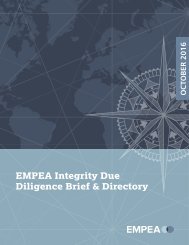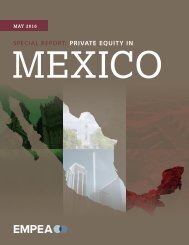You also want an ePaper? Increase the reach of your titles
YUMPU automatically turns print PDFs into web optimized ePapers that Google loves.
Importance <strong>of</strong> Domestic Flows<br />
– Accessing domestic funds<br />
– Domestic investment opportunities<br />
The weighting <strong>of</strong> these different criteria will depend on the<br />
nature <strong>of</strong> the fund, <strong>of</strong> the potential investors in the fund, and<br />
the primary investment opportunities.<br />
Taxation<br />
Most funds operate in a competitive environment, and for<br />
them the returns paid to investors are crucial. Such funds<br />
seek as low as possible an effective tax rate. Given the<br />
competition from tax havens with zero tax rates, the effective<br />
tax rate needed to secure such footloose funds—i.e., those<br />
that have a wide choice <strong>of</strong> jurisdictions for registration—is<br />
close to zero.<br />
However, this depends partly on the domestic tax regime<br />
applicable to the investor. If the investor is subject to<br />
domestic taxation—which determines the final tax rate—<br />
then it is not necessary for the fund to have a low tax rate<br />
in its home jurisdiction; what is important is that any taxes<br />
that are paid can be <strong>of</strong>fset against the investor’s domestic<br />
tax liability. Hence a wide network <strong>of</strong> Double Taxation<br />
Agreements (DTAs) is essential.<br />
For financial centres dealing with mainly international flows<br />
(A-C in Figure 2 above), tax may be levied in the jurisdiction<br />
where the final investment takes place (C), and investors<br />
will be liable for taxation in their home jurisdiction (AC). If<br />
the FC imposes a significant additional layer <strong>of</strong> taxation,<br />
this is likely to be a disincentive for investment funds to be<br />
domiciled there.<br />
Regulatory Framework<br />
There is a common perception that fund managers seek<br />
jurisdictions with light regulation and that allow a high degree<br />
<strong>of</strong> secrecy regarding operations and beneficial ownership.<br />
This is not borne out by discussions with managers (although<br />
they might not admit it if this were their objective). What<br />
appears to be more important is a regulatory environment<br />
that is “reasonable,” and most importantly, transparent,<br />
predictable and consistent, with a regulator that is efficient<br />
(i.e., takes decisions and acts quickly).<br />
Also important is the knowledge and attitude <strong>of</strong> foreign<br />
regulators towards a particular jurisdiction. If a fund is intending<br />
to attract US investors, the attitude <strong>of</strong> the US regulator<br />
(SEC) and the investors themselves towards the jurisdiction<br />
is crucial.<br />
An important component <strong>of</strong> the regulatory framework,<br />
although not directly related to financial service operations,<br />
is the extent <strong>of</strong> exchange controls. Jurisdictions without<br />
exchange controls have a distinct advantage, and investors<br />
are generally reluctant to be exposed to the restrictions<br />
and delays involved in abiding with capital controls, where<br />
they exist.<br />
Support Services, Skills and Infrastructure<br />
Fund managers prefer to have access to a well-developed<br />
network <strong>of</strong> support services to deal with administrative and<br />
financial management tasks, as well as to manage interaction<br />
with the regulator. Access to skills is essential, and this can<br />
cover a wide range from basic administrative and financial<br />
management skills through to more sophisticated banking,<br />
asset management, investment, financial engineering and<br />
legal skills. Access to the more sophisticated skills may not<br />
be essential in the early stages <strong>of</strong> developing a financial<br />
centre, however, as it is likely that the operational aspects<br />
<strong>of</strong> a fund will be located elsewhere. To the extent that more<br />
sophisticated skills are needed and are not available locally<br />
in the financial centre, a liberal and efficient immigration<br />
system is essential to enable access to foreign skills.<br />
The availability <strong>of</strong> reasonable real estate (<strong>of</strong>fice and<br />
residential property), transport and communications are<br />
also essential.<br />
There are many “clustering” advantages in developing<br />
a financial centre, i.e., success tends to be reinforcing.<br />
The establishment <strong>of</strong> financial service operations in a FC<br />
stimulates the emergence <strong>of</strong> support services, which then<br />
tends to attract further financial services investment, in a<br />
virtuous circle. One <strong>of</strong> the main challenges in developing<br />
new FCs is achieving this critical mass. It may be easier<br />
in a larger economy that already has a developed financial<br />
sector servicing the domestic economy than in a smaller<br />
economy that has to do so from scratch.<br />
For funds that intend to undertake a stock market listing<br />
(which may be attractive to investors), a jurisdiction with a<br />
recognised and developed stock market is essential.<br />
72 |





